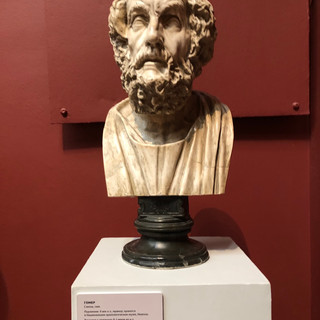Who was Homer?
- Eileen Dara

- Mar 7, 2020
- 2 min read
Homer was the legendary author of the Iliad and the Odyssey, two epic poems that are the central works of ancient Greek literature. The Iliad is set during the Trojan War, the ten-year siege of the city of Troy by a coalition of Greek kingdoms. It focuses on a quarrel between King Agamemnon and the warrior Achilleslasting a few weeks during the last year of the war. The Odyssey focuses on the ten-year journey home of Odysseus, king of Ithaca, after the fall of Troy. Many accounts of Homer's lifecirculated in classical antiquity, the most widespread being that he was a blind bardfrom Ionia, a region of central coastal Anatoliain present-day Turkey. Modern scholars consider these accounts legendary.
The Homeric Question – concerning by whom, when, where and under what circumstances the Iliad and Odyssey were composed – continues to be debated. Broadly speaking, modern scholarly opinion falls into two groups. One holds that most of the Iliad and (according to some) the Odyssey are the works of a single poet of genius. The other considers the Homeric poems to be the result of a process of working and reworking by many contributors, and that "Homer" is best seen as a label for an entire tradition. It is generally accepted that the poems were composed at some point around the late eighth or early seventh century BC.
The poems are in Homeric Greek, also known as Epic Greek, a literary language which shows a mixture of features of the Ionic and Aeolicdialects from different centuries; the predominant influence is Eastern Ionic. Most researchers believe that the poems were originally transmitted orally. From antiquity until the present day, the influence of Homeric epic on Western civilization has been great, inspiring many of its most famous works of literature, music, art and film. The Homeric epics were the greatest influence on ancient Greek culture and education; to Plato, Homer was simply the one who "has taught Greece" – ten Hellada pepaideuken.
Today only the Iliad and Odyssey are associated with the name 'Homer'. In antiquity, a very large number of other works were sometimes attributed to him but these claims are not considered authentic today and were by no means universally accepted in the ancient world.
The Homeric epics are written in an artificial literary language or 'Kunstsprache' only used in epic hexameter poetry. Homeric Greek shows features of multiple regional Greek dialects and periods, but is fundamentally based on Ionic Greek. The Homeric poems were composed in unrhymed dactylic hexameter; ancient Greek metre was quantity rather than stress-based. Lastly, Homer frequently uses set phrases such as epithets ('crafty Odysseus', 'rosy-fingered Dawn', 'owl-eyed Athena', etc.), Homeric formulae ('and then answered [him/her], Agamemnon, king of men', 'when the early-born rose-fingered Dawn came to light', 'thus he/she spoke'), simile, type scenes, ring composition and repetition. These habits aid the extemporizing bard, and are characteristic of oral poetry. For instance, the main words of a Homeric sentence are generally placed towards the beginning, whereas literate poets like Virgil or Milton use longer and more complicated syntactical structures. Homer then expands on these ideas in subsequent clauses; this technique is called parataxis.








Comments